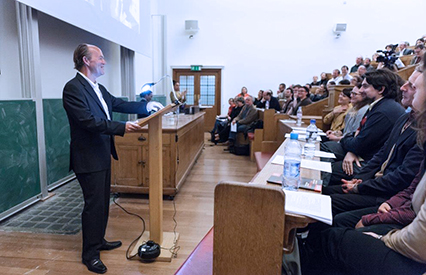Dr. J.A. Karl delivered the third in his series of lectures on unexpected side-effects of recombinant D.N.A. as applied to gene therapy:

Ladies and Gentlemen, I am happy to see so many of the same faces as I saw at my two lectures on the effects of fish D.N.A. on human test subjects.
It looks like you are bringing your friends to these lectures! Welcome! I think you’ll consider the case of another single male subject, whom I shall refer to as “R”, to be similarly fascinating.

R agreed to subject himself to an experimental attempt to improve human diving physiology.
That is, we hoped that R would end up with a greatly improved ability to hold his breath for long periods of time and an improved ability to avoid decompression sickness, also known as "the bends".
We spliced D.N.A. from Lepidochelys olivacea, the olive ridley sea turtle, onto one of his chromosomes to give him these abilities.

After the procedure, we advised him to find something relaxing to do.
Here is what he later reported to us:
He took his sister's suggestion to rest at the beach with her and his nieces. He lay on the beach and allowed his nieces to bury him in the sand where he relaxed so well that he fell asleep. His sister and nieces left him alone as they went off to play volleyball.
After a couple of hours, his sister and nieces decided they had better wake him up. They helped him uncover himself and emerge from the hot sand.
R reports that his first awareness of side-effects came when his nieces gasped "Uncle R, you've got breasts! Nice ones!!"
Many of you will know that sea turtles are subject to TSD -- temperature-dependent sex-determination and that ridley sea turtle eggs incubated at temperatures of 31 to 32 °C produce only females. Evidently, the sand in which R's nieces had buried him reached that temperature, resulting in R's sexual phenotype being changed to female.
We must have inadvertently spliced onto R’s D.N.A. a turtle gene giving him the ability to undergo female development in hot sand.

She has a good sense of humour about it. She introduces herself as "Olive Ridley".
She further reports that she regularly returns to the same beach just as sea turtles do but that, unlike sea turtles, she is happy to be flipped onto her back on the beach!


Thanks, AG!!! I appreciate it!!! It occurred to me later that i should have included a line about R being able to go down and stay down for a long time -- something like a sea turtle but not quite. : D
ReplyDeleteI might be able to alter it a bit for you.
Delete